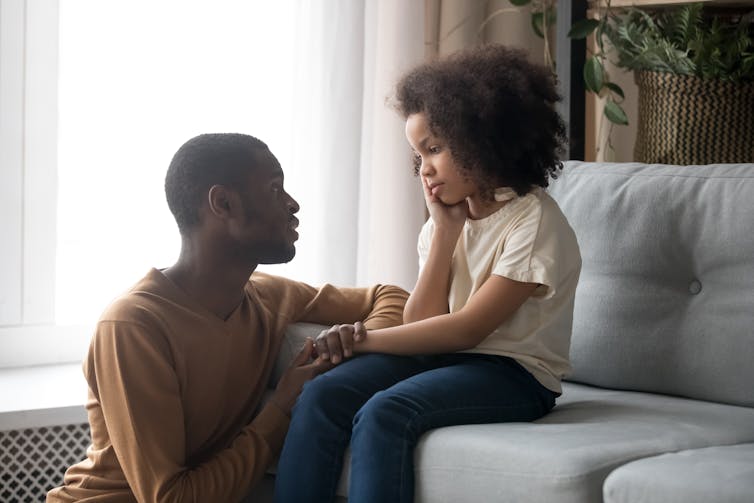Comment | Children on coronavirus: 'Don’t just tell us to wash our hands and say it will be okay'

Pexels
Lucy Bray, Edge Hill University; Holly Saron, Edge Hill University, and Jo Protheroe, Keele University
Children’s lives in the UK have been changed by the COVID-19 pandemic. Many are no longer attending school, seeing grandparents or friends and are being asked to stay at home with their families to save lives.
Children are learning, connecting and doing PE remotely, drawing rainbows and clapping every week for key workers. But like the adults in their lives, many will be experiencing uncertainty, confusion and have questions about COVID-19 and the world they are now living in.
There has been an overwhelming amount of health information and misinformation about COVID-19 – which has been described as an “infodemic”. Many resources have been developed specifically for children, to provide information and to help them cope with their worries and concerns. There are leaflets, children’s newspapers, TV programmes like Newsround, short stories, video clips and Q&A sessions.
These colourful and child-friendly resources tell children about the virus and how to stay safe through social distancing and washing their hands. The resources include tips on how to cope and activities to keep busy during lockdown. But most of these resources have been developed by adults and may not address children’s questions and concerns.
Questions and answers
In our study, with colleagues Bernie Carter, Lucy Blake and Jennifer Kirton, we asked children aged seven to 12 years old how they accessed information about COVID-19 and their understanding of the virus and the need for lockdown.
They told us that their parents were their main source of information and that they want to know more than “it will be okay” or that they need to “wash their hands”. They want answers to questions such as “why don’t children get poorly?”, “how many people are dying each day?” and “how will we know that it’s really safe to go out when lockdown ends?”

We also asked parents how they accessed information about COVID-19 and how they shared this information with their children. We found that many parents tried to shield their children from “the worst of it”, and limit their child’s access to the constant stream of COVID-19 information. Most children however, are aware the world is in crisis and people are dying from the virus – as one child we spoke to explained:
I don’t know what is happening, because people play it down and tell me it can’t kill people, but people are dying every day.
Withholding information
Our previous research shows that parents can find it hard to judge what information is “right” to share with their children about difficult topics. This can lead to parents withholding information to try and protect their child from becoming upset.
In our study, we’ve found that many parents are making similar decisions in relation to sharing COVID-19 information with their children – as one mother of a seven-year-old explained:
[We share] whatever info won’t cause too much anxiety and we downplay it. [We] mainly just discuss how we can protect ourselves.
Typically parents talked about reassuring their child that “everything will be completely fine”. But we know from previous research that empty reassurances without appropriate facts and information can result in children being left to “fill in the blanks”, using their imagination and snippets of information gleaned through different channels.
Indeed, being told “don’t worry” can be unhelpful when a person is trying to understand what’s going on and find ways to cope with a situation. And this can actually increase children’s anxiety and feelings of uncertainty.
What to do instead
Children are an essential part of the national effort to manage this pandemic. They have a right to be provided with information that is of importance to their wellbeing. This right is not being addressed by simply telling children to wash their hands, stay in and not worry. Children should be able to ask questions and explore what is going on “out there” with adults they trust.
Colourful child-friendly resources are useful to begin conversations, but are not an end point. Our findings show that children have questions about COVID-19 that are not being addressed. These questions will differ from child to child.
As adults, we should acknowledge that we do not know “all the answers”, and be confident enough to open up conversations with children. These conversations should happen at multiple levels – and be aided by campaigns where children’s questions and concerns can be acknowledged and addressed nationally. Schools and teachers should also be involved to help support learning opportunities and build understanding. Most important though are the conversations children will have with their parents and carers.
A good starting point for these conversations is to ask your children, “what do you want to know?” and “what questions do you have?” Through doing this, not only can children be empowered to identify their information needs and concerns, but it also means that adults do not need to simply rely on providing empty reassurance.![]()
Lucy Bray, Professor in Child Health Literacy, Edge Hill University; Holly Saron, Research Fellow in the Faculty of Health, Social Care and Medicine, Edge Hill University, and Jo Protheroe, Professor of General Practice, Keele University
This article is republished from The Conversation under a Creative Commons license. Read the original article.
Most read
Contact us
Andy Cain,
Media Relations Manager
+44 1782 733857
Abby Swift,
Senior Communications Officer
+44 1782 734925
Adam Blakeman,
Press Officer
+44 7775 033274
Ashleigh Williams,
Senior Internal Communications Officer
Strategic Communications and Brand news@keele.ac.uk.


